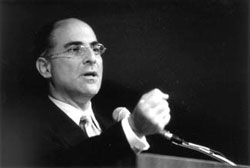Education Giants Come Together at TC to Discuss Leadership
With education reform at the top of the political agenda, combined with a shortage of quality superintendents, and principals threatening plans for school renewal, more than 450 educators, community, business and policy leaders came to Horace Mann Auditorium at Teachers College to discuss issues of leadership in education.
Leader's Count, The Educational Initiative of The Wallace-Reader's Digest Funds sponsored a "National Conference on Educational Leadership," that addressed the issue of the lack of qualified school superintendents and principals. Speakers such as Harold O. Levy, Chancellor of New York City Schools and Richard W. Riley, U.S. Secretary of Education were on hand to talk about how the best leaders can be placed into school systems.
"Education has embarked on a huge, high-profile experiment," said TC President Arthur Levine. "In the nation's two biggest school districts and the eighth largest-New York City, Los Angeles, San Diego- it has been decided that perhaps a legal and administrative background is more suitable for providing leadership for teaching and learning than the hands-on experience of an educator."
President Levine discussed the troubled state of New York City schools and recognized that this is the perfect opportunity to modify it. Levine noted how in changes in medicine "produced research that mattered, models that worked and raised standards for doctors-now it's time to do that for teachers."
"The people in this room-professional associations, scholars, press, philanthropic communities-have the power to change education like our predecessors did for medicine," said Levine. He introduced M. Christine DeVita, President of Wallace-Reader's Digest Funds who "built this fund and took this job as a child".
DeVita agreed, "We have the ingredients here to make change." She explained how the Education Initiative began as way to improve student performance and use creative ways to strengthen people who want to take teaching jobs. The Initiative tries to facilitate changes in districts and comes up with "possible pathways to solutions" that teachers, principals and superintendents face.
Chancellor Levy found the task of leadership to be "more art than science." Prior to being appointed, he was Director of Global Compliance for Citigroup, Inc. and a New York State Regent. Levy illustrated-sometimes humourously- the challenges he encountered when going through the transition of being a corporate leader to a leader in New York City Schools.
Levy said keeping the schools in clean working order is the best ways to begin changing the system. "Having water fountains that don't work sends the wrong message," said Levy. "How can we teach people to read if we can't even keep the schools neat?"
Having the facilities in working order gives teachers, principals and superintendents the right environment to do their jobs. Levy also wants to evaluate superintendents and pinpoint where troubled areas in the school system might be.
Teachers not only directly effect students' lives, but are good candidates for filling leadership roles such as principal and superintendent. Levy touched on Teacher quality and applauded those teachers who "perform miracles everyday." But, he said, there are others who must be weeded out of the profession. Professional development is very important to keep teachers' ideas fresh and to keep them excited about what they do.
"The most important thing we can do is to build up the quality of teaching staff and keep them," said Levy. "Quality matters from top to bottom-from custodian to teacher to superintendent. Public education does work if we are given the right tools. The tools are to recruit the best-and they don't come cheap."
A panel of superintendents moderated by John Merrow named being a superintendent as "The Toughest Job in America." Anthony Alvarado (former chancellor) of San Diego, CA said that creating better principals, or leaders in general, is a question of training. He said that the current training programs are inadequate.
David Hornbeck, past Superintendent of Philadelphia Schools, said, "Great educational leaders know education and the teaching-learning process. Core technical knowledge about education is essential. The problem with education is that we are moving towards generic leadership without knowing the blood and guts of education."
Secretary Riley also touched on appropriate learning environments and the difficulty of finding and keeping good leaders. Principals have to deal with wide-ranging issues beyond the normal challenges of curriculum and teaching. "Principals have to figure out what to do with a student body that can't eat at the Cafeteria due to a water leak or other issues that crop up when schools aren't in tip-top shape," said Riley. "Some of our best prospects don't actually become principals because of all the managerial and other work that keeps them from actually focusing on teaching."
Riley noted some of the steps that the government is taking to ensure that the best leadership is in schools. The first one is $40 million for new initiatives in a "School Leadership Institution" which will train as many as 10,000 current or prospective administrators. It will include regional centers and eventually a national academy to raise leadership to the highest level.
Another way of encouraging teachers is the National Board for Professional Teaching Standards that established high and rigorous standards for teaching using a national voluntary system to certify teachers. Part of the completed certification process includes $5,000-$10,000 salary supplements that will eventually be extended to principals and superintendents. Nearly 1900 teachers have already achieved National Board Certification and more than 6700 candidates are seeking certification this year. Finally, Riley mentioned that it is necessary to come up with new ways to enlarge the pool of candidates from outside of education such as recruiting and training professionals from other fields.
"Good ideas can come from this conference-some of our school leadership matters could come forward and be of great interest to this country," said Riley.
Published Tuesday, Sep. 18, 2001
